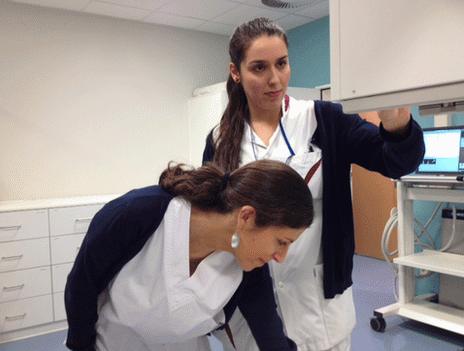Hunting jobs across the eurozone
- Published

Maria Eduarda Louto da Silva (left) and Joana Maria Soares Maig are Portuguese nurses working in Belgium
Thousands of skilled workers who cannot find work in Greece, Spain and Portugal could help fill vacancies in other parts of the EU, officials in Brussels say.
The European Commission is trying to improve co-operation between government employment agencies in different countries to make it happen. But will it work? And is increased job mobility a good thing in the long run?
Pedro Guimaraes, 45, supervises a team of construction workers as they put the finishing touches to a new block of flats in northern Belgium.
It is a chilly, misty day and he is wrapped in a well-worn sheepskin jacket underneath a florescent yellow tabard.
"I came here from Portugal around six months ago," he says, balancing carefully on a metal walkway.
"I was without a job for three months and this was a way to pay the bills, because I have a lot of bills!"
In Portugal more than 15% of the potential workforce is unemployed, compared with 7% in Belgium.
"The negatives are [that I am] too far away from my children and my friends and the good weather too," Mr Guimaraes adds.
He relocated with the help of Portugal's government employment service, the IEFP.
It has started expanding its co-operation with public job agencies in Belgium and other parts of northern Europe, as part of the EU's employment services network, EURES.
On Monday the Commission said EURES would be modernised, with a more user-friendly online job search and a bigger focus on young people, considered to be more mobile. The job matches will include apprenticeships, combining work and learning opportunities.
Bigger pool
This year Portugal has hosted several European Job Days - recruitment fairs where potential candidates can be matched with employers from abroad.
Mr Guimaraes's boss, Hans Jacob, was one of them.

Pedro Guimaraes works as a foreman on a building-site in Belgium
"Belgium has a shortage of construction workers and engineers, so we have advertised abroad before," Mr Jacob says.
"But these kinds of co-ordinated initiatives are much easier for us."
Across the EU, only around 3% of working-age adults (aged 15-64) currently live in another EU member state.
But there is evidence that those from the most troubled economies are becoming increasingly willing to move abroad to find work.
Between January 2009 and November 2012, the number of people from Portugal, Greece and Spain signed up to the EU's online job matching service increased from 60,000 to around 300,000.
However, records suggest only about 5,000 of those jobseekers secured work through the site or other initiatives organised by EURES.
There are an estimated 5.5m unfilled vacancies across Europe.
'Brain drain'
"We know from the statistics that job mobility of people within the EU is very low and there is a lot of room for improvement," admits Gregorio De Castro, a EURES employment policy officer.
But he argues that EURES is making a transition from an advice and information outlet to one that deals more closely with job-matching and recruitment, and points out that some data on successful matches might have been missed.
Critics might point out that EU's online job-matching service was launched in 2003 and the eurozone crisis is about to enter its sixth year.
"The employment recovery has taken longer than expected," accepts Mr De Castro.
There has been strong criticism of the EU's strategy from the European Trade Union Confederation (ETUC), which organised pan-European demonstrations against high unemployment and austerity earlier this month.
"This could lead to a brain drain and a youth drain," says deputy general secretary Patrick Itschert.
"Free movement of work is a fundamental right but if too many engineers, for example, move [away] from Spain and Portugal, it will have an absolute impact on the future of industry, on the economy in those countries in the following years."
He believes there could also be problems for member states that receive workers from other parts of the EU.
"You have to make sure that there is equal pay and equal work and conditions. And you have to be aware that there is probably some unemployment in those countries as well."
Language challenge
In the town of Aalst, just outside Brussels, Joana Maria Soares Maig, 24, and Maria Eduarda Louto da Silva, 29, are two Portuguese nurses who have also made the move to Belgium this year.
They found work through a private agency after taking an intensive course in Dutch, the language most commonly spoken in the north of Belgium.
"It was difficult in the beginning, I missed my family," says Ms Soares Maig, who is working in the hospital's radiology department.
"It is also hard for a Portuguese girl to learn this language."
Both women have left their boyfriends behind and share a small apartment together.
Back on the building site, Pedro Guimaraes says he wants to return to Portugal as soon as he can, but he has plenty of Portuguese friends who are planning to settle in Belgium for good, after relocating their families.
"They know that the way of life is easier and they could live better here," he says.
Mr Guimaraes looks likely to remain separated from his family for a while longer, as well as from his beloved sunshine.
Increased job mobility may yet help cut unemployment, but for those who make the decision to move abroad, it often comes with sacrifices.